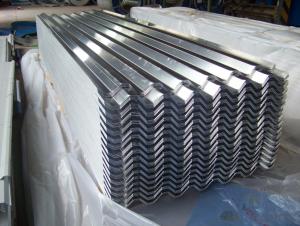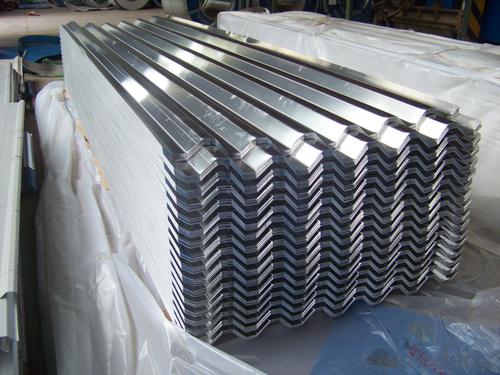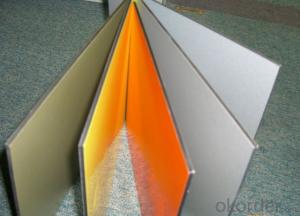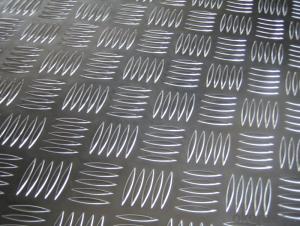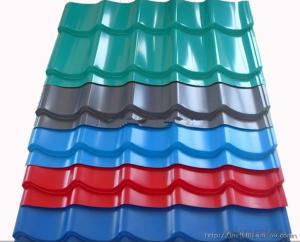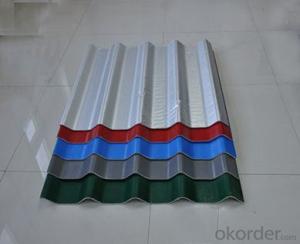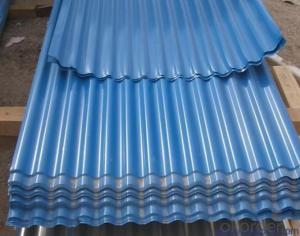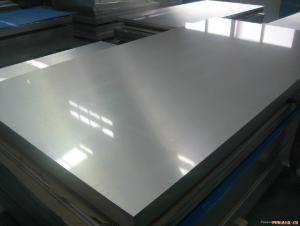Adhesive Brushed Aluminum Sheets - Aluminium Roofing AA1XXX
- Loading Port:
- China Main Port
- Payment Terms:
- TT OR LC
- Min Order Qty:
- -
- Supply Capability:
- -
OKorder Service Pledge
OKorder Financial Service
You Might Also Like
Aluminium Foil Anti-Corrosion Heat Insulation Roofing Sheet is made of stone powder,
and more than 10 different kinds of inorganic chemical materials with the inside backbone fabric glass cloth.
It features high strength, beautiful, durable in use, fireproofing, frost resisting, corrosion resisting etc,
and the product life could reach more than 20 years; it has overwhelming performance advantages
over the other traditional roofing materials, such as asbestos roofing sheet, glass fiber roofing sheet,
cement roofing sheet and steel roofing sheet. The Product has past the test of PuYang City Quality
Supervision and Inspection Center, each performance index has reached and exceed JC / T747-2002
national standard.
| Big Wave | Medium Wave | Small Wave | |
| Length | 1000 mm -7000 mm | 1800, 2400, 3000 mm | 2400 mm |
| Width | 970 mm | 970 mm | 720 mm |
| Tickness | 4.5-6 mm | 4.5-6 mm | 4-6 mm |
| Wave Height | 55 mm | 40 mm | 25 mm |
| Wave Number | 4.5 | 7.5 | 11.5 |
| Wave Distance | 200 mm | 100 mm | 50 mm |
| Weight/ M | 9-11 kg | 9-11 kg | 7-9 kg |
- Q: Explain the impact of aluminum sheets on the thermal insulation of a building.
- <p>Aluminum sheets, due to their high thermal conductivity, can significantly reduce the thermal insulation of a building. They allow heat to transfer easily through them, which can lead to increased heat loss in winter and heat gain in summer. This can result in higher energy consumption for heating and cooling, making the building less energy-efficient. However, when used in combination with proper insulation materials and techniques, aluminum sheets can still be part of an effective building envelope, provided their thermal bridging effects are mitigated.</p>
- Q: Are the aluminum sheets suitable for manufacturing food processing equipment?
- Aluminum sheets, indeed, prove to be fitting for the production of food processing equipment. This metal, lightweight and enduring, possesses resistance against corrosion, rendering it exceptionally suitable for deployment within the food industry. Moreover, aluminum is free from toxicity, odorlessness, and devoid of any detrimental impact on the flavor or excellence of the processed food. Furthermore, aluminum can be effortlessly cleansed and maintained, thus guaranteeing adherence to hygiene guidelines. Additionally, owing to its capacity to proficiently conduct heat, aluminum serves as an apt choice for cooking and baking applications. All in all, the myriad advantageous attributes of aluminum sheets establish them as a widely favored option for the manufacture of food processing equipment.
- Q: Is plastic or alumium container more harmful to store food in if it does get to the food while heating.
- Neither is great, but aluminum is worse (especally when heated). Also you can't put aluminum in the microwave since it sparks (technically it should not be used for cooking), but plastic leaches stuff info food, especially if it's via ceranwrap on top (in a microwave). Storing things in platic tupperware in the fridge is fine since the temperatures are cold enough that no reactions can happen, but for cooking and eating, ceramic is preferable. Aluminum on the other hand should just be avoided (for baking pyrex glass/ceramic is better). Out of all the forms of aluminum, aluminum foil is the most likely to leech stuff. Hope that helps!
- Q: Can aluminum sheets be used in food packaging?
- Yes, aluminum sheets can be and are commonly used in food packaging. Aluminum is a popular choice for food packaging due to its excellent barrier properties, which protect the food from light, oxygen, moisture, and other external factors that can spoil or contaminate it. Aluminum sheets are lightweight, durable, and resistant to corrosion, making them suitable for various types of food packaging, such as foil wraps, containers, trays, and pouches. Additionally, aluminum is a recyclable material, making it an environmentally friendly choice for food packaging.
- Q: What is the standard thickness of aluminum sheets used for constructing carports or garages?
- <p>The thickness of aluminum sheets commonly used for carports or garages typically ranges from 0.022 to 0.032 inches (0.56 to 0.81 mm). This range provides a balance between strength and cost-effectiveness. Thicker sheets offer greater durability and resistance to weathering, while thinner sheets are more affordable but may require more maintenance over time. The specific thickness chosen often depends on the design requirements, local weather conditions, and the intended lifespan of the structure.</p>
- Q: What are the typical thicknesses of aluminum sheets?
- The specific application and industry requirements can cause variations in the typical thicknesses of aluminum sheets. Nevertheless, there are several standard thicknesses commonly used, including 0.025", 0.032", 0.040", 0.050", 0.063", 0.080", 0.090", 0.100", 0.125", and 0.190" inches. These thicknesses find application in diverse industries like construction, automotive, aerospace, and manufacturing. It is worth mentioning that aluminum sheets can be tailored to meet precise thickness specifications for specialized applications.
- Q: Can aluminum sheets be used for food packaging?
- Indeed, aluminum sheets possess the potential to serve as food packaging. Owing to its distinctive qualities, aluminum emerges as a favored material for food packaging. Its attributes include being lightweight, flexible, and possessing exceptional barrier properties, enabling it to safeguard food products effectively from moisture, light, oxygen, and other external impurities. Aluminum sheets frequently find application in packaging diverse food items, including beverages, canned goods, ready-to-eat meals, and snacks. Moreover, aluminum is recyclable, rendering it an environmentally conscious preference for food packaging.
- Q: Can the aluminum sheets be used for manufacturing food storage containers?
- Yes, aluminum sheets can be used for manufacturing food storage containers. Aluminum is a highly suitable material for food storage due to its non-toxic properties, excellent heat conductivity, and resistance to corrosion.
- Q: What is the weight per square foot of 101 aluminum sheets?
- The weight per square foot of 101 aluminum sheets can vary depending on the thickness of the sheets. Generally, the weight of aluminum is measured in pounds per square foot (lbs/ft²). To determine the exact weight per square foot of 101 aluminum sheets, you would need to know the thickness of each sheet. Once you have the thickness, you can use the density of aluminum, which is approximately 0.098 pounds per cubic inch (lbs/in³), to calculate the weight per square foot.
- Q: What are the different types of aluminum sheets?
- There exists a variety of aluminum sheets, each possessing distinct characteristics and applications. Here are some commonly encountered types: 1. The plain aluminum sheet, with its smooth surface and uniform thickness, serves as the fundamental option. It holds widespread usage across various industries for general purposes. 2. The embossed aluminum sheet, achieved by rolling the metal through a patterned roller, presents a textured or patterned surface. It finds common application in fields like interior design or automotive trim, where decorative purposes are desired. 3. The perforated aluminum sheet, as its name implies, contains small holes or perforations throughout its surface. It frequently finds application in architectural scenarios, such as building facades or sunscreens, as well as in filtration systems. 4. The treadplate aluminum sheet, also known as checker plate or diamond plate, exhibits a raised pattern of lines or diamonds on its surface. This pattern enhances traction, making it suitable for industrial flooring or stair treads, where slip resistance is vital. 5. The anodized aluminum sheet undergoes an electrochemical process, forming a protective oxide layer on the surface. This process enhances durability, corrosion resistance, and allows for color customization through dye acceptance. Architectural applications, signage, and consumer products commonly employ anodized aluminum sheets. 6. The painted aluminum sheet, coated with a layer of paint, not only enhances appearance but also provides added corrosion protection. It is often utilized in applications where aesthetics are paramount, such as building facades, signage, or automotive parts. These examples represent a small selection of the aluminum sheet types available in the market. The selection of an appropriate type depends on specific project requirements, encompassing factors like durability, appearance, corrosion resistance, or slip resistance.
Send your message to us
Adhesive Brushed Aluminum Sheets - Aluminium Roofing AA1XXX
- Loading Port:
- China Main Port
- Payment Terms:
- TT OR LC
- Min Order Qty:
- -
- Supply Capability:
- -
OKorder Service Pledge
OKorder Financial Service
Similar products
Hot products
Hot Searches
Related keywords
